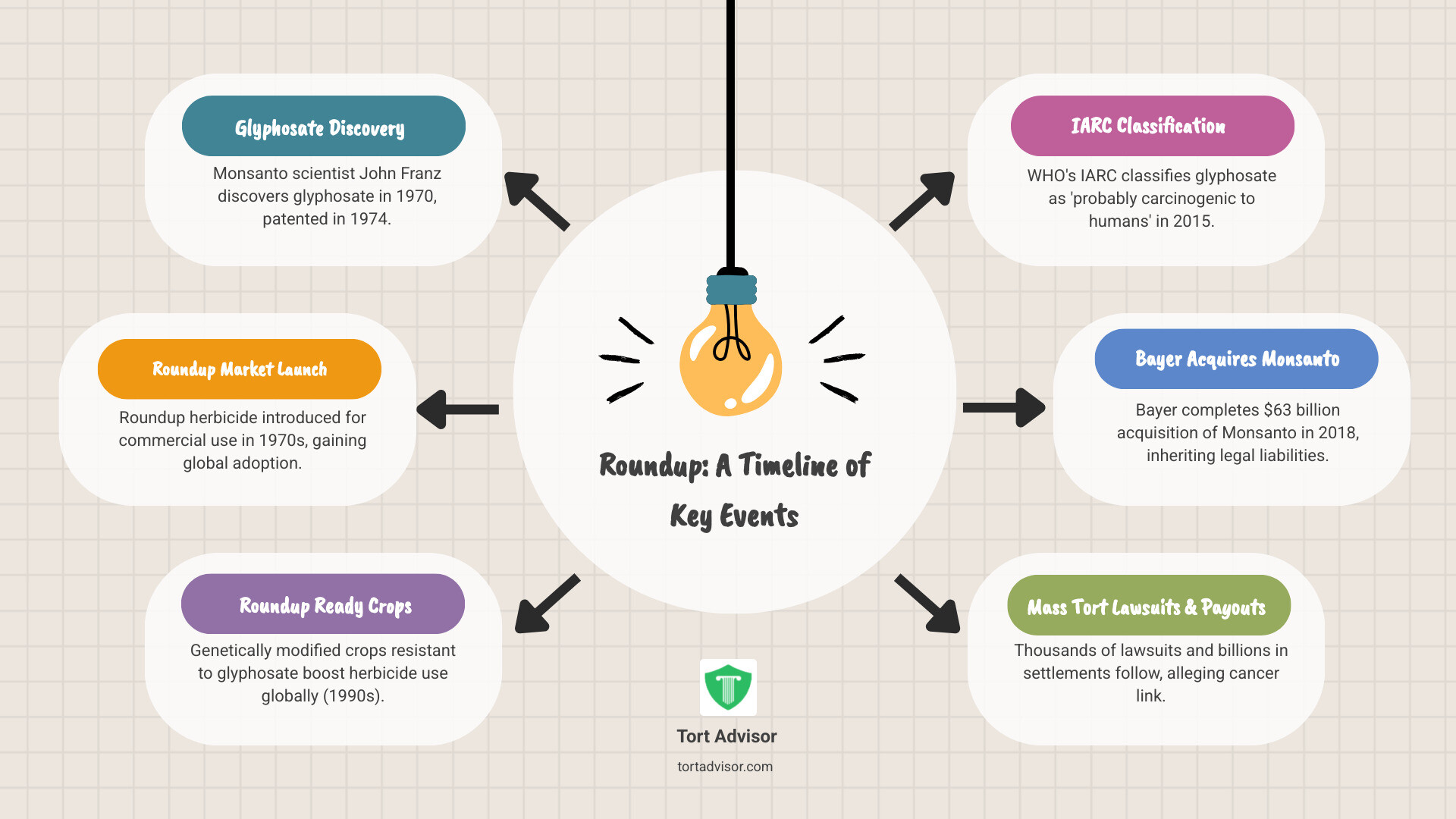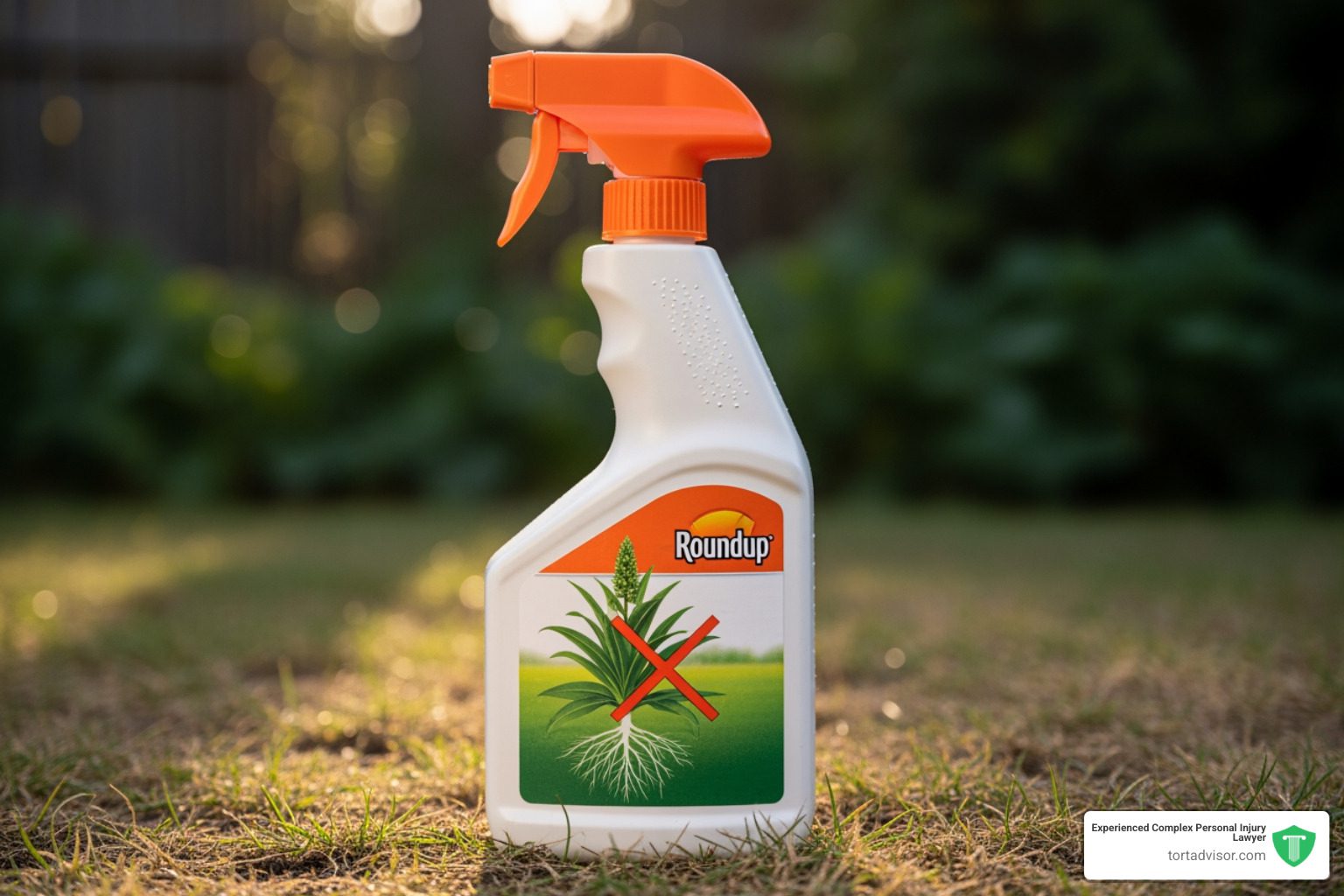


The Company Behind Roundup Weed Killer
When you think of roundup weed killer manufacturer, the name Bayer AG might not immediately come to mind. Yet, this global pharmaceutical and life sciences company is indeed the current force behind the world’s most popular weedkiller, Roundup. Originally developed by Monsanto, Roundup became a household name and a staple for farmers around the globe. Its widespread use, however, has been overshadowed by a storm of controversy and legal battles. As one report noted, “Roundup’s time may be up. Pharmaceutical and agriculture conglomerate Bayer said it could stop producing the world’s most popular weedkiller, unless it gets court protection against lawsuits blaming the herbicide for causing cancer.” This statement highlights the critical juncture Bayer faces, caught between its profitable product and a tidal wave of litigation.
Here’s a quick look at the roundup weed killer manufacturer:
- Original Developer: Monsanto Company
- Current Manufacturer (since 2018): Bayer AG
Relevant articles related to roundup weed killer manufacturer:
Who is the Roundup Weed Killer Manufacturer?
So, who exactly is the roundup weed killer manufacturer today? Well, if you’re picturing a massive, global company, you’re on the right track! It’s none other than Bayer AG, a German powerhouse known for everything from aspirin to advanced pharmaceuticals. This huge company stepped into the agricultural spotlight in 2018 when it completed its colossal acquisition of Monsanto. This move wasn’t just about expanding their reach; it made Bayer a true titan in agriculture. However, along with Monsanto’s vast assets, Bayer also inherited something else… a mounting pile of legal challenges tied to Roundup.
Roundup’s story is pretty fascinating on its own. Its superstar ingredient, glyphosate, was first found by Monsanto way back in 1970 and patented in 1974. Farmers quickly fell in love with it because it was incredibly effective at zapping unwanted weeds. But the real game-changer? That came with the ‘Roundup Ready’ genetically modified crops. These crops were specially engineered to shrug off glyphosate, meaning farmers could spray their fields, kill the weeds, and leave their precious crops untouched. Talk about a win-win for weed control! This clever combo led to Roundup becoming a household name and a dominant force in agriculture.
The Original Inventor: Monsanto
Before Bayer stepped onto the scene, the original roundup weed killer manufacturer was, without a doubt, the Monsanto Company. Picture an agricultural chemical giant, founded all the way back in 1901, that grew into a true powerhouse. Monsanto was famous for its groundbreaking work in pesticides and, later on, genetically modified organisms (GMOs). They were the ones who patented glyphosate, and around that single ingredient, they built an impressive empire.
Their market dominance was truly immense. Believe it or not, as of 2009, Roundup herbicides alone accounted for about 10% of Monsanto’s revenue, and the entire Roundup product line contributed to roughly half of their yearly earnings! That’s a lot of weed killer. But Monsanto’s story isn’t just about innovation and success. It’s also been marked by its fair share of controversy, from its historical ties to Agent Orange to ongoing debates about its seed patents and farming practices. This long and often bumpy road ultimately set the stage for the massive legal battles that would later engulf the company that acquired them.
If you’re curious to dig deeper into the legal challenges that haunted the original manufacturer, you can find More info about Monsanto Roundup Lawsuits.
The Current Owner: Bayer’s High-Stakes Acquisition
Fast forward to 2018, and Bayer AG made headlines around the world with its eye-popping $63 billion acquisition of Monsanto. This was a bold move for Bayer, designed to dramatically expand its presence in the agricultural sector and create a global leader in crop science. On paper, it looked like a brilliant strategic play.
However, what seemed like a smart business decision quickly turned into a major headache, a truly high-stakes gamble. You see, Bayer didn’t just buy Monsanto’s assets; they also inherited its biggest problem: literally thousands of lawsuits claiming that Roundup caused cancer. It was a classic case of ‘buying the company, buying its problems too!’
The financial impact was immediate and brutal. In just ten months after the June 2018 acquisition, Bayer’s stock value plummeted by a staggering 46%. This massive drop was largely due to the escalating legal challenges. It was a stark and painful reminder that sometimes, a big purchase comes with an even bigger price tag in unexpected ways. Managing these post-acquisition challenges has been an immense undertaking for Bayer, forcing them to pour significant financial and strategic resources into handling the ongoing legal fallout. In a telling move, shortly after the acquisition, Monsanto’s famous name was even dropped, perhaps a quiet attempt to distance the new entity from the controversies of the past. You can learn more about that symbolic change here.
The Unprecedented Legal and Financial Fallout
Imagine stepping into a new home, only to find it comes with a surprise guest: a massive, ongoing legal battle. That’s pretty much what happened when Bayer bought Monsanto. Suddenly, they were plunged into one of the biggest legal fights in history, a “mass tort litigation” as the lawyers call it. By 2023, around 165,000 claims had piled up against Bayer. These lawsuits mostly say that using Roundup caused people to get a serious illness called non-Hodgkin’s lymphoma. This huge wave of legal challenges has created a truly unprecedented financial headache for the roundup weed killer manufacturer.
The money impact on Bayer has been nothing short of staggering. We’re talking about billions upon billions of dollars in settlements and verdicts. It’s truly reshaping the company’s financial future and what they focus on.
A Tidal Wave of Lawsuits and Billion-Dollar Verdicts
The numbers here are truly mind-boggling. Bayer has already paid out roughly $10 billion to people who sued over Roundup. And get this: even though they made $2.8 billion from selling glyphosate last year, the company figures they’re losing $2 billion to $3 billion every single year just because of Roundup lawsuits. That’s a huge chunk of their money, essentially eating into their profits and making it harder for them to grow or invest in new things.
To try and handle the sheer number of claims and what might come next, Bayer has put aside a colossal $16 billion specifically to settle cases. This massive amount really shows how serious the situation is and how hard the company is trying to move past these legal battles.
Now, it’s not all bad news for Bayer; they have won some cases, like 10 out of 15 Roundup cancer cases that went to trial by December 2023. But the verdicts against them have been absolutely monumental. Take January 2024, for example, when a Pennsylvania jury hit Monsanto and Bayer with a staggering $2.25 billion verdict (including $2 billion in extra “punitive” damages) for one man’s cancer. This follows other high-profile cases, like Dewayne Johnson’s, a groundskeeper who was first awarded $289 million (though it was later reduced). Or the California couple who received an $86 million award (after their initial $2 billion verdict was cut down). We’ve also seen Bayer settle claims about false advertising for $39.5 million in March 2020 and another $6.9 million in June 2023. These figures really paint a clear picture of the immense financial pressure the roundup weed killer manufacturer is currently under.
For a deeper dive into these ongoing legal twists and turns, you can check out A look at recent Roundup case updates.
Bayer’s Multi-Pronged Strategy to Manage the Crisis
Facing this constant legal attack, Bayer has come up with a clever, multi-part plan to handle the crisis and limit how much they might have to pay in the future.
One big part of their plan has been to lobby state legislatures. Bayer is actively trying to convince U.S. states, like Georgia and North Dakota, to pass new laws about how pesticides are labeled. The big hope here is that these laws could help stop lawsuits before they even start by saying that federal labeling rules are more important than state-level lawsuits claiming they didn’t warn people enough about cancer risks.
Another crucial part of their strategy involves reaching out to the highest court in the land: the U.S. Supreme Court. Bayer has asked the Supreme Court to decide if federal law (specifically, the Federal Insecticide, Fungicide, and Rodenticide Act, or FIFRA) should override state lawsuits that claim Roundup didn’t warn about cancer dangers. If the Supreme Court were to side with Bayer, it could drastically cut down on future lawsuits. However, this is a long shot, and legal experts have different ideas about whether it will actually happen.
Perhaps the most significant strategic move from the roundup weed killer manufacturer has been their decision to stop selling glyphosate-based Roundup for home use in the U.S. market by 2023. While farmers will still be able to use it, this move aims to lower the risk of future lawsuits from everyday consumers. It’s a clear sign that the company is trying to control the story and reduce its chances of facing more claims down the road.
The Scientific Debate: Is Glyphosate Carcinogenic?
Okay, let’s get to the heart of the matter that’s driven all these lawsuits and headlines: Is glyphosate, the main ingredient in Roundup, truly linked to cancer? It’s a question that sounds simple, but the answer is surprisingly complex, with different scientific groups often coming to different conclusions. This difference in scientific opinion is a major reason why the lawsuits have been so persistent and why the debate continues to rage on.
The World Health Organization vs. Global Regulators
The conversation really heated up in 2015. That’s when the International Agency for Research on Cancer (IARC), which is part of the World Health Organization (WHO), looked closely at glyphosate. They came out with a big announcement: they classified glyphosate as “probably carcinogenic to humans” (Group 2A). Think of it like saying, “Hey, there’s a good chance this could cause cancer.” This classification was a huge moment, and it fueled many of the lawsuits that followed, giving plaintiffs a scientific basis for their claims.
You can dive into their detailed findings if you’re curious in the IARC Monograph on Glyphosate.
Now, here’s where it gets tricky. Many other important health and safety groups around the world, like the U.S. Environmental Protection Agency (EPA), have looked at the same science and come to a different conclusion. The EPA, for example, has consistently said that glyphosate is “not likely to be carcinogenic to humans” when used as directed. It’s a bit like two different doctors looking at the same X-ray and having different opinions.
Similarly, other major regulators, such as the European Food Safety Authority (EFSA), the Canadian Pest Management Regulatory Agency (PMRA), the German Federal Institute for Risk Assessment, and the Australian Pesticides and Veterinary Medicines Authority (APVMA) have all stated that glyphosate is unlikely to pose a cancer risk to people when used correctly.
So, why the different answers? It often comes down to how these groups study things. IARC focuses on whether something can cause cancer at all (hazard identification), while others, like the EPA, look at whether it’s likely to cause cancer under real-world use (risk assessment). It’s a subtle but super important difference. Here’s a quick look at how some of these major players see things:
| Organization | Conclusion on Glyphosate Carcinogenicity | Methodology/Focus |
|---|---|---|
| IARC (WHO) | “Probably carcinogenic to humans” (Group 2A) | Hazard identification (potential to cause cancer under any exposure) |
| US EPA | “Not likely to be carcinogenic to humans” | Risk assessment (likelihood of causing cancer under real-world exposure conditions) |
| EFSA | No evidence to classify as carcinogenic | Risk assessment |
This creates a puzzling scenario for the public and a challenging one for the roundup weed killer manufacturer. It’s this very disagreement among scientific bodies that forms the core of the ongoing legal arguments.
Beyond Glyphosate: The Role of Other Ingredients
While glyphosate gets all the headlines, it’s not the only ingredient in Roundup. The product also contains “other ingredients,” often called “inert” ingredients, like surfactants such as polyethoxylated tallow amine (POEA). These aren’t just filler; they’re added to help the weed killer work better – to spread and soak into plants more easily.
However, scientific studies have shown that some of these “helpers,” especially POEA, can actually be more toxic than glyphosate itself, particularly to things like aquatic life. This means that the complete Roundup product, with all its ingredients mixed together, might have a different, and sometimes increased, level of toxicity compared to just glyphosate on its own.
This complexity has led to more trouble for the roundup weed killer manufacturer. For instance, Bayer has had to settle lawsuits over false advertising claims. Some of these lawsuits argued that the product was marketed as “safe” even though concerns existed about its full chemical makeup and its potential environmental effects. These settlements, which have added up to millions of dollars, show that the legal scrutiny goes beyond just whether glyphosate causes cancer; it looks at the whole product and how it’s presented to the public.
The Future of Roundup and Its Impact on Agriculture
The whirlwind of legal battles and ongoing scientific debates has cast a pretty long shadow over what’s next for Roundup. And it’s not just about the weed killer itself; it has huge implications for the entire agricultural industry that has come to rely on it so heavily. The roundup weed killer manufacturer, Bayer, finds itself in a truly tight spot.
Bayer’s CEO has even issued some rather blunt warnings, hinting that the company might just stop making Roundup in a matter of “months, not years.” That is, unless they can secure proper court protection against the constant stream of lawsuits. This isn’t just corporate bluster; it really highlights the massive financial strain and damage to their reputation that the company is struggling with.
Imagine the ripple effect if Roundup production actually stopped. It would be huge for the global food supply and for farmers worldwide. For decades, glyphosate, Roundup’s active ingredient, has been a true workhorse in modern agriculture. It helps farmers control weeds efficiently, which in turn helps crops grow better and yields more food. Many farmers depend on it for their very livelihood, and a sudden withdrawal could throw the entire system into disarray.
What Happens if the Roundup Weed Killer Manufacturer Stops Production?
So, what if Bayer, the current roundup weed killer manufacturer, decided to pull the plug on Roundup production completely? The consequences would be felt across the globe. Just think about this: Bayer is responsible for producing about 40% of the world’s glyphosate. That’s a staggering amount! Replacing that volume overnight would be an absolutely monumental task.
For farmers, the impact would be profound. Glyphosate has made practices like no-till farming possible, which is great for reducing soil erosion and saving fuel. It’s also incredibly effective at controlling a wide range of weeds, ensuring that crops get all the nutrients they need to thrive. Without it, farmers would likely face much tougher challenges managing weeds. This could lead to lower crop yields and, you guessed it, higher operational costs for them. These increased costs could even mean higher food prices for us, the consumers.
The agricultural industry would have to scramble to find effective alternatives. This could mean using other chemical herbicides (each with their own safety considerations) or adopting more labor-intensive methods like mechanical weeding. Or, even bigger changes like embracing entirely new farming practices. This kind of transition wouldn’t be easy, nor would it be cheap.
Navigating the Future for the Roundup Weed Killer Manufacturer
Bayer’s journey ahead is definitely full of challenges. We can expect to see continued legal battles, with each new verdict and appeal potentially setting new precedents. A possible ruling from the U.S. Supreme Court on the FIFRA preemption argument remains a huge factor that could dramatically reshape the landscape of future lawsuits.
Beyond the courtroom, the roundup weed killer manufacturer will likely keep adjusting its operations and product lineup to reduce its risks. This might mean putting a greater focus on new agricultural technologies, perhaps developing non-glyphosate herbicides or innovative digital farming solutions. The goal is to diversify what they offer and become less dependent on products that stir up controversy. We’ve already seen them pull residential glyphosate products from store shelves, and that move certainly signals a broader shift in their strategy.
The company’s approach is a delicate balancing act: they need to defend their current products while also innovating for a future that could look very different. How successfully they steer these ongoing legal and financial problems will largely determine the long-term impact on Bayer’s profits, its research and development efforts, and its overall corporate strategy. We at Tort Advisor are keeping a close eye on these developments, as they have significant implications for both the industry and for anyone who might have been affected by Roundup exposure.
For more information on the current state of legal actions, you can visit our page on active lawsuits.
Conclusion
The story of Roundup, from its beginnings with Monsanto to its current ownership by Bayer, is truly a journey through science, law, and the complex world of corporate finance. What started as a tool for agriculture has become the center of a massive legal storm. This has forced a huge company to face billions in payouts and steer a very uncertain future.
For you, as a consumer, or for farmers who rely on these products, this situation creates a lot of questions. While many official bodies, like the EPA, say that glyphosate is safe when used correctly, the World Health Organization’s classification and the many court verdicts show a real public concern. This lack of agreement keeps the legal battles going strong.
At Tort Advisor, we understand just how complicated these large legal cases can be. Our goal is to make sure that anyone affected by products like Roundup can find the justice and skilled legal help they deserve. If Roundup has impacted you or a loved one, it’s really important to know what your options are. We’re here to connect you with top-rated specialty attorneys who have a proven track record of getting the best results for their clients.
Free Confidential Case Evaluation
Complete the short form below to get an immediate FREE case review with an expert in your specific claim. Don't wait, your case could be time sensitive to file a claim.
Related Posts
Discover New Jersey disability benefits: TDI, FLI, SSDI, SSI rates, eligibility, applications & appeals for 2025-2026.
Hire a Depo-Provera lawsuit attorney now. Fight Pfizer for meningioma risks from injections. Free consult, MDL updates & settlements up to $1.5M.
Find top Miami florida car accident lawyers after your 305 crash. Get max compensation, navigate no-fault laws & choose the best experts now!
Diagnosed with cancer after Roundup? Learn about the monsanto roundup lawsuits, eligibility criteria, and how to pursue your claim.
Discover how do you qualify for a hair relaxer lawsuit: criteria, diagnoses, evidence & brands in uterine cancer MDL. Claim review now!
Find the best uber sexual assault lawsuit lawyer: expert guides, MDL experience, proven results & nationwide firms for justice.











